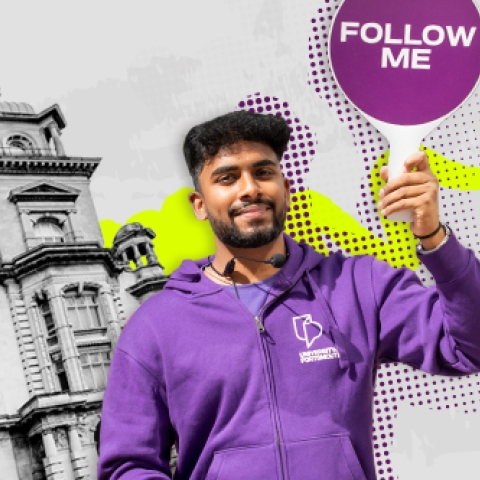
Sidebar navigation
- Art & Design Taster Day
- Built Environment Project Day
- Law and Business Taster Day
- Computing Taster Day
- Criminology Taster Day
- English, Creative Writing & Journalism Taster Day
- Geography and Environmental Taster Day
- English Taster Afternoon
- History, Politics and International Relations Taster Afternoon
- Health Sciences Taster Day
- Languages Taster Day
- Maths and Physics Taster Days
- Performance Taster Afternoon
- Psychology Taster Day
- Sport and Exercise Science Taster Day
- Subject Taster Day guide
- STEM events for schools and colleges

Coming soon
Explore English Language and Literature
Explore the power of language and a rich literary history with degrees in English. From classic literature to contemporary media, your students will delve into texts that frame our world and explore how linguistics can shape our thoughts, emotions and actions.
This year's event took place in May 2024. New dates and bookings will open soon.
See what happened at the taster
In the meantime, explore our island city at one of our Open Days, discover student life at Portsmouth, and take look at different English courses.
Student life
Explore our island city and its many attractions, and find out what student life is really like at the University.

Undergraduate Open Days
Thinking about joining us as an undergrad? Book your spot at one of our upcoming Open Days.

English and creative writing courses
Writing has the power to transport readers and listeners to an entirely different time and place. Tailor your studies to suit your goals, and graduate with the knowledge and skills find your dream career.

English Literature BA (Hons)
English Literature at Portsmouth gives you skills in creative and critical thinking, for any career where communication counts. In the city of Charles Dickens and Sherlock Holmes, you’ll explore how stories ask complex questions of society and identity, and learn to analyse the truth of any text.
Foundation year option available
Start date: September 2026

Explore Language and Linguistics degrees
"Language is a really powerful thing." Meet the students and lecturers from our BA (Hons) English Language and Linguistics course, discover what they love about the subject and how it can help in your future career.
Lucy: Language is a really powerful thing. I think it's so powerful that you don't even notice that you can do so much with it. But studying that is really interesting, and I just had a moment where I was like, this is the course I want to do.
William Forsyth: Some of the topics we cover on the course lead into a lot of things that people want to do afterwards, so we have quite a lot on education. For people who want to go into publishing and marketing, using social media, we have clinical linguistics for people who want to go into language therapy and that kind of thing. We have forensic linguistics.
Grahame Luff: Forensic linguistics is the study of language applied to forensic situations in context, i.e. looking at written documents and speech and using that to solve crime. The skills that students will learn will be analytical skills, the ability to take new ideas and concepts and apply them to different situations.
William Forsyth: We have two modules aimed specifically at teaching English to non-native speakers. The first one is called TESOL, which is Teaching English to Speakers of Other Languages. And the second one is an accredited module examined by Trinity.
Rebecca Hamlet: Trinity is a recognised teaching qualification and it qualifies students to teach in language schools all over the world and TESOL is the input for that. They are assigned to a tutor, they work with a class and they deliver lessons with feedback and support from their tutors.
William Forsyth: By undertaking the BA, that will allow them to go and do a Master's course, there's then the opportunity to do a PhD, set up their own consultancy service or join the police.
Rebecca Hamlet: Many jobs involve language and linguistics because it is about communication. I can't think of many careers where understanding about language wouldn't be enormously helpful.
Alexander: I've definitely taken an interest in forensics as well as the language of law. So I've applied for various Master's along the line of forensic accounting as well as a conversion to law. But this courses has definitely helped me get a much clearer line of what I'd like to do moving forward.
Max: I think what made me really realise that I loved the course was during the start of COVID-19, it was a difficult time for a lot of students, and a lot of people in general. I still found myself enjoying the lectures, even from a distant learning point of view. And then when coming back into the classroom this year, really made me go, "Okay, I've loved it online and now I love it in person."
William Forsyth: The reason why I would recommend students coming to Portsmouth is that the teaching staff are excellent, the provision that the teachers provide is excellent and the support that students will receive here is also excellent.
Lucy: When I visited the University of Portsmouth, it just clicked for me because I'd visited a number of other unis and it just didn't feel right. But when I visited here, I just loved the closeness of everything to each other and it just felt right.
Rebecca Hamlet: Language and linguistics has many, many different aspects because at the end of the day, language is everything. We are surrounded by it. It's powerful and we need to know how it works in society.
At our English Taster Afternoon your students can get ready to:
- Explore the intricate differences between English Language, Linguistics and Literature degrees with our Senior Lecturers
- Personalise their afternoon by choosing your sessions – choosing between studying texts with Literature in context to compliment the current curriculum, select Language options that lead to linguistic discoveries or explore both across the afternoon
- Immerse themselves in Margaret Atwood's dystopian Handmaid's Tale, the history of the gothic genre, Shakespearean Tragedy with Othello or Hardy's Tess of the D’Urbervilles with our Literature options
- Explore how Language in the workplace, how speech disorders occur, the ways in which linguistics is involved in social justice and how language is used in lying with our English Language strand
- Chat to lecturers and current students about their experiences studying at Portsmouth and the placement options for during degrees
Programme
Here's what happened at the English Taster in May 2024.
Check-in from 12.45pm in Park Building, King Henry I St, Portsmouth, PO1 2BZ.
Get an overview of what's coming up on your Taster Afternoon and learn the differences between studying English Language and Literature degrees.
*Pick to attend 1 of the following sessions when you book your place.
Gothic (English Literature)
Examine the origins of Gothic Literature from the late 18th century to its evolution in the 19th century from novels such as Frankenstein, The Strange Case of Dr Jekyll and Mr Hyde and Dracula. You'll consider how the the genre is defined by its relationship to an imagined past.
Margaret Atwood, The Handmaid’s Tale (English Literature)
Explore the many methods that Atwood uses to make The Handmaid's Tale an unreliable narrative. By looking at a selection of quotes from the novel, you'll consider the significance of the unreliability and its influence on our reading of the novel as an example of 'Speculative Fiction'.
Language in the Workplace (English Language)
Look at the differences and similarities of language in the workplace and everyday language. Using sample video texts, you will look at distinctive features of the workplace and how language varies across different workplace settings.
Investigating Language Disorder (English Linguistics)
Your students will explore Clinical Linguistics, a a branch of linguistics that studies language disorders, including speech disorders.
This session will look at some samples of clinical language data and analyse the linguistic deficits evident in the patients - such as those with communication difficulties caused by developmental disorders, brain injuries, or degenerative diseases.
Quick breather. Take stock of the afternoon then get ready for the next session, with a chance to chat with students and lecturers at the University of Portsmouth.
*Pick to attend 1 of the following sessions when you book your place.
Shakespearean Tragedy – Othello (English Literature)
Discover the literary debates concerning the Shakespearean tragedy, where you'll consider the meaning and significance of tragedy in Othello and the play's complex construction of excessive love, death and otherness.
Thomas Hardy – Tess of the D’Urbervilles (English Literature)
This session looks at Tess of the D’Urbervilles in light of Victorian debates around the ‘Woman Question’ and the ‘New Woman’, and explores ways in which Tess both conforms to and challenges nineteenth-century constructions of femininity.
Language and Social Justice (English Language & Linguistics)
How is language linked to racism? How do accents cause discrimination? What is the connection between language and power?
This session will delve into the ways in which language is involved in various forms of social justice and injustice.
Language and Deception (English Language & Linguistics)
Deception is a common occurrence in daily life, and while people are skilled at lying, they often struggle to detect lies.
This session will use a Forensic Linguistic approach to examine the language of deception and how to identify linguistic signs of lying."
To conclude our afternoon together, we invite you to ask questions of our lecturers and current students!
This could be about different English degrees, the transition from college to uni, any of the talks you've watched so far, moving away from home – and/or whatever you want to know about uni.
